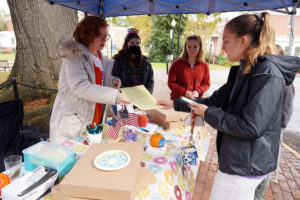Wearing a white slicker and black rain boots, University of Mary Washington senior Caroline Mowdy approached a tent set up outside George Washington Hall. She needed a ride to the polls. Soon, she was in psychology major Christian Lyman’s blue Toyota Scion and on the way to her voting site, Dorothy Hart Community Center in Fredericksburg.

“As an environmental sustainability major, protections and regulations are important to me,” Mowdy said. “In almost every class I’ve been in, I’ve learned that it all comes back to politics.”
With key Virginia appointments at stake, UMW students like Mowdy braved today’s cool, drizzly weather to get to the polls. It’s the Mary Washington way. Seventy-nine percent of UMW students – more than the national average – cast ballots in the last election, according to the National Study of Learning, Voting and Engagement (NSLVE) report, released last week. Today, UMW Votes, a group that encourages engaged citizenship, lined up a cavalcade of cars, vans and even a trolley to transport students to polling sites and make sure their voices were heard.
“It’s really important, no matter who they vote for,” said sophomore historic preservation major Vivian Reinhardt, who cast her absentee ballot weeks ago but worked with UMW Votes to help those who’d waited until Election Day. “We need more turnout from every age and demographic possible.”
The group pushed early voting this year, said junior philosophy major and Campus Vote Project Fellow Kate McDaid. But, with few classes in session on UMW’s second annual Day on Democracy, members were determined to be on hand for fellow students on Election Day. Gathered beneath a blue tent with sugary doughnuts to entice passersby, they distributed sample ballots, helped voters locate their polling places (based on the location of their residence or residence hall), checked registration statuses and answered questions.

“The fact that nearly four out of five Mary Washington students voted in the 2020 election – much higher than the national average – says a lot about their commitment to community and the political process,” said Center for Community Engagement Associate Director Sarah Dewees, who joined UMW Votes volunteers beneath the tent. “They’re engaged in the world around them and are active participants in our democracy.”
Mary Washington provided transportation to 165 voters in 2019, Dewees said, but with COVID-19 curtailing ride-sharing last year, efforts – weekly walks to cast early votes, Uber and Lyft codes, and more – ramped up. For its resiliency through the pandemic, the University was featured in last month’s 2020 Voter Friendly Campus Report.
Created by the Institute for Democracy and Higher Education at Tufts University, NSLVE derives its data by matching student enrollment records with public voting files, offering colleges and universities a closer look at their political learning and engagement climate.

UMW junior Keegan Fredrick, who was among today’s UMW Votes volunteers and planned to cast her own ballot in Spotsylvania County, has been immersed in the world of politics since she was 7. “Everyone should have the opportunity to use their voice and amplify their voice so their opinions are heard,” she said. “It’s important they know how and why to vote.”
Senior Arianna Rodriguez, a sociology and women’s, gender and sexuality studies double-major, agrees.
“If you want things to change in your community, voting is the way to do it,” she said. “You’ve got to get your voice out there.”



